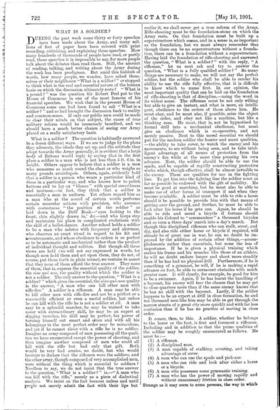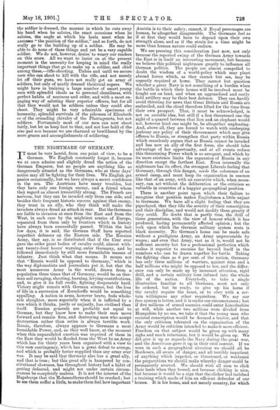WHAT IS A SOLDIER? D URING the past week some thirty
or forty speeches have been made about the Army, and many mil- lions of feet of paper have been covered with print recording, criticising, and explaining those speeches. How many hundreds of thousands of people have read, or partly read, those speeches it is impossible to say, for more people talk about the debates than read them. Still, the amount of reading, talking, and writing about the Army during the week has been prodigious. But amid this hubbub of words, how many people, we wonder, have asked them- selves or their neighbours "What is a soldier?" or stopped to think what is the real and essential nature of the humvri basis on which the discussion ultimately rests ? "What is a pound ? " was the question Sir Robert Peel put to the House of Commons in one of the most famous of his financial speeches. We wish that in the present House of Commons some one had been found to ask "What is a soldier ? "and so had brought the discussion back to reality and common-sense. If only our public men could be made to clear their minds on that subject, the cause of true military reform would be immensely benefited, and we should have a much better chance of seeing our Army placed on a really satisfactory basis.
What is a soldier ? The question is habitually answered in a dozen different ways. if we are to judge by the plans they advocate, the ideals they set up, and the attitude they adopt towards the Army generally, it is evident that a large body of Britons would reply by saying that in the first place a soldier is a man who is not less than 5 ft. 6 in. in height. Others appear to believe that a soldier is a man who measures so much round the chest or who weighs so many pounds avoirdupois. Others, again, evidently hold that a soldier is a person who wears a particular kind of dress in a particular way, and who knows how to polish buttons and to lay on " blanco " with special smoothness and neatness,—in fact, they think that a soldier is essentially a man in uniform. Yet others regard him as a man who at the sound of certain words performs certain muscular actions with precision, who assumes with correctness "the position of the soldier" as laid down in the Drill Book= eyes looking to the front, chin slightly drawn in,' &c.—and who keeps step and maintains his place in complicated evolutions with the skill of a ballet-dancer. Another school holds a soldier to be a man who salutes with frequency and alertness, who observes an exact ritual in regard to his kit and accoutrements, and whose obedience to orders is so perfect as to be automatic and mechanical rather than the product of individual thought and volition. But though all these views are held (we will not say expressed in words, for though men hold them and act upon them, they do not, of course, put them forth in plain terms), we venture to assert that they none of them afford the true answer. They none of them, that is, express the essential quality of the soldier, the sine qua' non, the quality without which the soldier is not a soldier. The only answer to the question, "What is a soldier? "which gives the essential, the sine-qucl -non quality is the answer, "A man who can kill other men with rifle-fire." A soldier is a rifleman. A man may be able to kill other men with rifle-fire and not be a perfect or a reasonably efficient or even a useful soldier, but unless he can Ell with the rifle he is not a soldier at all. A man may be a splendid marcher, he may be trained to take cover with extraordinary skill, he may be an expert at digging trenches, his drill may be perfect, his power of turning himself out smart and clean and with all his belongings in the most perfect order may be miraculous, and yet if he cannot shoot with a rifle he is no soldier. Imagine an army composed of men possessing all the quali- ties we have enumerated except the power of shooting, and then imagine another composed of men who could all kill with the rifle but had only that gift. Both would be very bad armies, no doubt, but who would hesitate to declare that the riflemen were the soldiers, and the other army, though composed of very accomplished men, were without the thing which is essential to soldiers ? Needless to say, we do not insist that the true answer to the question, "What is a soldier ? " is,—"A man who can kill with the rifle," merely as a piece of dialectical analysis. We insist on the fact because unless and until people not merely admit the fact with their lips but realise it, we shall never get a true reform of the Army. Rifle-shooting must be the foundation-stone on which the Army rests. On that foundation must be built up a superstructure which seems, and in a sense is, as important as the foundation, but we must always remember that though there can be no superstructure without a founda- tion, there can be a foundation without a superstructure. Having laid the foundation of rifle-shooting and answered the question, "What is a soldier ? " with the reply, "A rifleman," let us next ask and try to answer the question, "What is a fully qualified soldier ? " So many things are necessary to make, we will not say the perfect soldier, but the soldier who shall be able to render his ability to use the rifle fully effective, that it is difficult to know which to name first. In our opinion, the most important quality that can be laid on the foundation of rifle-shooting is that of discipline,—using the word in its widest sense. The rifleman must be not only willing but able to give an instant, and what is more, an intelli- gent, obedience to the orders of those above him. He must obey, and he must also, if possible, seize the object of the order, and obey not like a machine, but like a thinking man. He must, that is, not be hypnotised by formal drill into a mechanical obedience, but must give an obedience which is co-operative, and not merely passive. Next to this moral essential we should put for the modern soldier the hunter and scout qualities, —the ability to take cover, to watch the enemy and his movements, to see without being seen, and. to take intel- ligent advantage of all means of protection from the enemy's fire while at the same time pressing his own advance. Next, the soldier should be able to use the spade, and be capable of rapidly constructing protective works which, though effective, shall be almost invisible to the enemy. These are qualities for use in the fighting line. To get him into the fighting line the soldier must as far as possible be endowed with the gift of mobility. He must be good at marching, but he must also be able to make use of other forms of transport if and when they become available. A soldier must be able to ride a horse should it be possible to provide him with that means of getting over the ground, and further, he must be able to look after his horse if he gets one. Again, he should be able to ride and mend a bicycle if fortune should enable his Colonel to " commandeer " a thousand bicycles and so turn a three days' march into a day's march. But though this disciplined rifleman who can stalk, scout, and dig, and also ride either horse or bicycle if required, will already be of great use in war, he can no doubt be im- proved by the addition of certain other things,—accom- plishments rather than essentials, but none the less of importance. If he is given a physical training which makes his frame and his muscles like those of an athlete, he will no doubt endure longer and shoot More steadily than if he has had no physical drill. Furthermore, if he is something of a gymnast, he will, if he is making a rapid advance on foot, be able to surmount obstacles with much greater ease. It will clearly, for example, be good for him to be a swimmer. Again, if he has learnt the handling of a bayonet, his enemy will fear the chance that he may get to close quarters more than if the same enemy knows that he has no skill with the bayonet. Lastly, if the soldier happens to be an expert at drill in close formation, he and ten thousand men like him may be able to get through the narrow streets of a great city more quickly and with far less confusion than if he has no practice at moving in close order.
It comes, then, to this. A soldier, whether he belongs to the horse or the foot, is first and foremost a rifleman. Including and in addition to that the prime qualities of the soldier may be roughly enumerated as follows. He must be :— (1) A rifleman.
(2) A disciplined man. (3) A man capable of stalking, scouting, and taking advantage of cover.
(4) A man who can use the spade and pick-axe. (5) A man who can ride and look after either a horse or a bicycle.
(6) A man who possesses some gymnastic training. (7) A man who has the power of moving rapidly and without unnecessary friction in close order. Strange as it may seem to some persons, the way in which the soldier is dressed, the manner in which he cuts away his hand when he salutes, the exact occasions when he salutes, the angle at which his heels meet when he assumes "the position of the soldier," and so forth, do not really go to the building up of a soldier. He may be able to do none of these things and yet be a very capable soldier. We do not, however, desire to weary our readers on this score. All we want to insist on at the present moment is the necessity for keeping in mind the really important things that go to make up a soldier, and chief among these,—rifle-shooting. Unless and until we secure men who can shoot to kill with the rifle, and not merely let off their guns, we have not really got an army of soldiers, but only of neatly dressed theatrical supers. We might have in training a large number of smart young men with splendid ideals as to personal cleanliness, with perfect habits of neatness and order, and with a most en- gaging way of saluting their superior officers, but for all that they would not be soldiers unless they could also shoot. They might be very admirable specimens of humanity, splendid survivals of the pikemen of Elizabeth or of the crusading chivalry of the Plantagenets, but not soldiers. Fortunately most of our men can now shoot fairly, but let us keep fast to that, and not lose hold of the sine quii non because we are charmed or bewildered by the mere graces and accomplishments of soldiering.







































 Previous page
Previous page